Empowering Government Teachers in India: Cascading Mentorship
by Heidi Faust
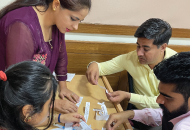 Over the past several years, TESOL has worked in
partnership with the U.S. Embassy New Delhi, local consulates, and state
ministries of education to implement a blended certificate program with state
government mentors in secondary public schools that has had an extensive reach.
This article highlights some of the innovations and outcomes of the TESOL
Blended Certificate Program for State Government Mentors as it has
evolved.
Over the past several years, TESOL has worked in
partnership with the U.S. Embassy New Delhi, local consulates, and state
ministries of education to implement a blended certificate program with state
government mentors in secondary public schools that has had an extensive reach.
This article highlights some of the innovations and outcomes of the TESOL
Blended Certificate Program for State Government Mentors as it has
evolved.

Opening day of in-person trainings in Chandigarh
and Punjab with embassy and ministry officials. (Click here to enlarge)
Program Overview
Program
Objectives
The overarching objective of this program is to
build capacity for teaching English as an additional language in a way that is
sustainable and impactful and aligned to India’s
National Education Policy released in 2020. Through a blended
certificate program, TESOL aims to
- support the development of 21st century skills,
-
connect Indian teachers to learner-centered and
communicative teaching practices,
-
and provide access to a global professional
network.
Another goal of the program is to enhance English
teaching and learning in a context where teachers have at minimum a bachelor's
degree in education, elementary education, or English literature because these
degrees provide little focus on language teaching theory or methodology.
State Government
Partners
The partnership began in 2017 with 50 mentors from
the Delhi State Government, which at the time employed more than 10,000 English
teachers, most of whose 2.2 million students came from disadvantaged
backgrounds. Committing over 25% of their budget to education and with a
growing mentorship program, the Delhi Government was an integral partner in
building and sustaining the successful program over multiple years. Building on
the impactful work in Delhi, the program was replicated in additional states.
In 2022, the program expanded to include mentors in
the states of Karnataka, West Bengal and Telengana, and in 2023, Punjab and the
Union Territory of Chandigarh joined the program, which has provided intensive
professional development to more than 300 state government mentors in six
states/territories to date.
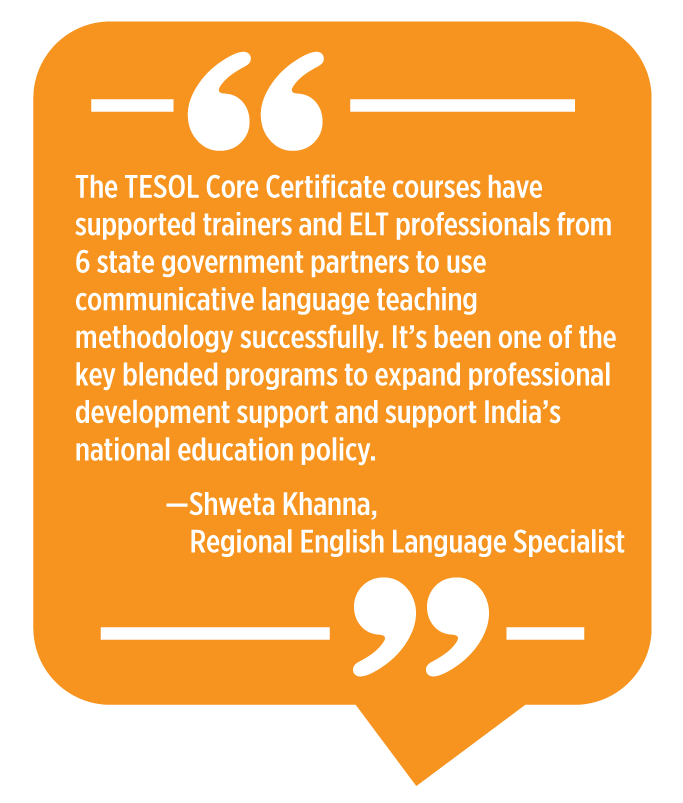 Professional Development
Program
Professional Development
Program
The original program provided a blended version of
the TESOL
Core Certificate Program (TCCP), a 140-hour certificate program
composed of two courses and a teaching practicum. Later iterations also
included offering the 60-hour Training
for Trainers course to support mentors in cascading learning to
colleagues regionally.
Replicating the Program Across Multiple States
Replicating the original program in new state
government contexts was both challenging and exciting and resulted in unique
innovations that were made to both the online and in-person components to
contextualize the professional development offerings to be more accessible in
terms of teacher access to resources, digital skills, and English language
proficiency. Innovations also considered the physical teaching environments and
intensive teaching schedules of the mentors. Key learning from replicating the program
across diverse contexts in India provided multiple insights for future
implementation.
Considerations and
Innovations
In replicating the courses in new state contexts,
it was important to have a shared vision with state partners to ensure that
recruitment, participation, and effective cascading occurred. Careful
recruitment ensured that teachers had sufficient English proficiency to
participate in the program, access to technology for the online courses, and
time in their schedule. Some teachers worked in residential schools where they
had house parent duties in the evenings in addition to full teaching days.
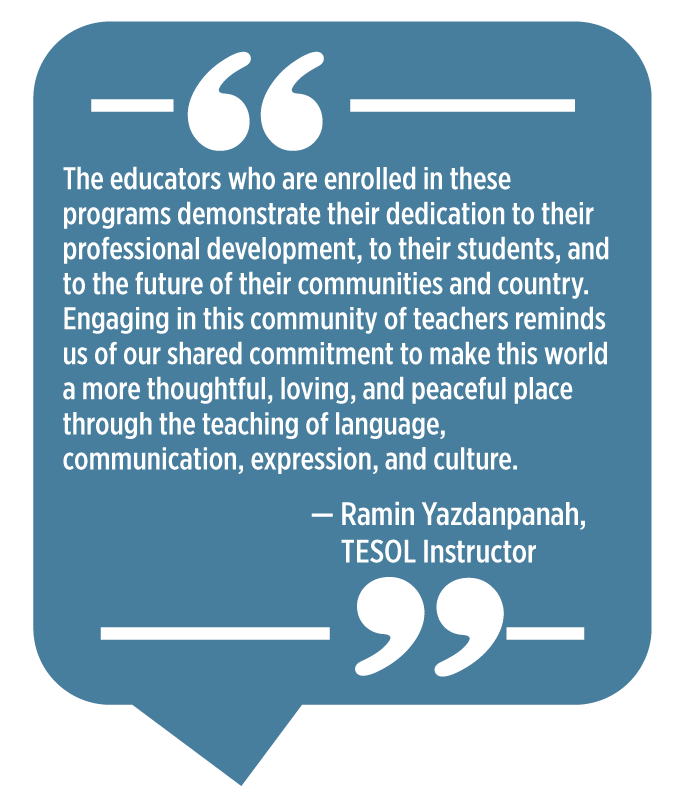 When possible, it was helpful for teachers to
receive work release time to complete the online coursework, which typically
required about 10 hours per week. Top-down leadership hierarchies required
administrative support, clear communication, and collaboration on logistics,
especially during the in-person courses.
When possible, it was helpful for teachers to
receive work release time to complete the online coursework, which typically
required about 10 hours per week. Top-down leadership hierarchies required
administrative support, clear communication, and collaboration on logistics,
especially during the in-person courses.
Online Course
Innovations
In both the TCCP Foundations of TESOL and Training
for Trainers asynchronous, facilitated, 6-week courses, adjustments were made
to the schedule and delivery of course content. Key innovations included the
following:
Onboarding and Engagement Support
- Providing a synchronous orientation to the course on Zoom
-
Staffing the course with an online instructional
assistant to support course navigation and engagement
-
Enrolling alternate participants to account for
attrition
-
Creating communities of practice on WhatsApp
groups
-
Adding a catch-up week in the middle and at the
end of the course
-
Allowing for flexible assignment
deadlines
Instructional Supports
- Adding virtual coaching sessions via live zoom
meetings with instructors
-
Incorporating videos of narrated presentations in
lieu of longer articles
-
Incorporating digital games and activities to
support academic vocabulary
-
Providing downloadable materials for offline
work
These supports were especially relevant in contexts
where mobile phones were more commonly used than email, and access to internet
data and computers was sometimes limited. The online instructional assistant
communicated with mentors regularly in the WhatsApp groups, and mentors
supported each other in accessing course information and understanding content
in these groups as an extension of course discussion groups in the Canvas
learning management system, where the courses were hosted. Mentor teachers had
intensive work schedules, and often had added leadership responsibilities in
their schools. Some communities also experienced flooding and extreme heat that
resulted in school closures, so flexibility in deadlines was key to participant
completion.
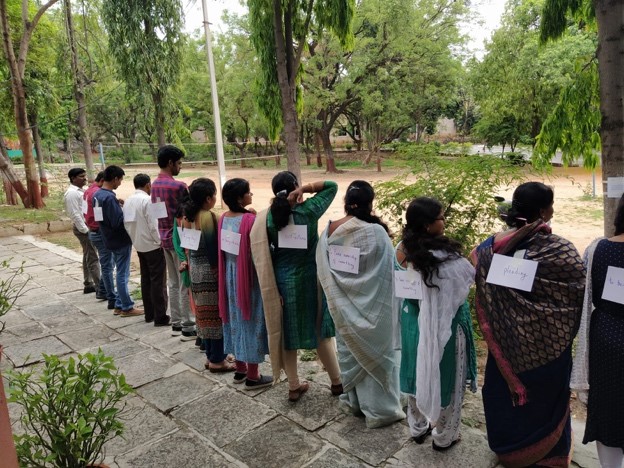
Interactive vocabulary games.
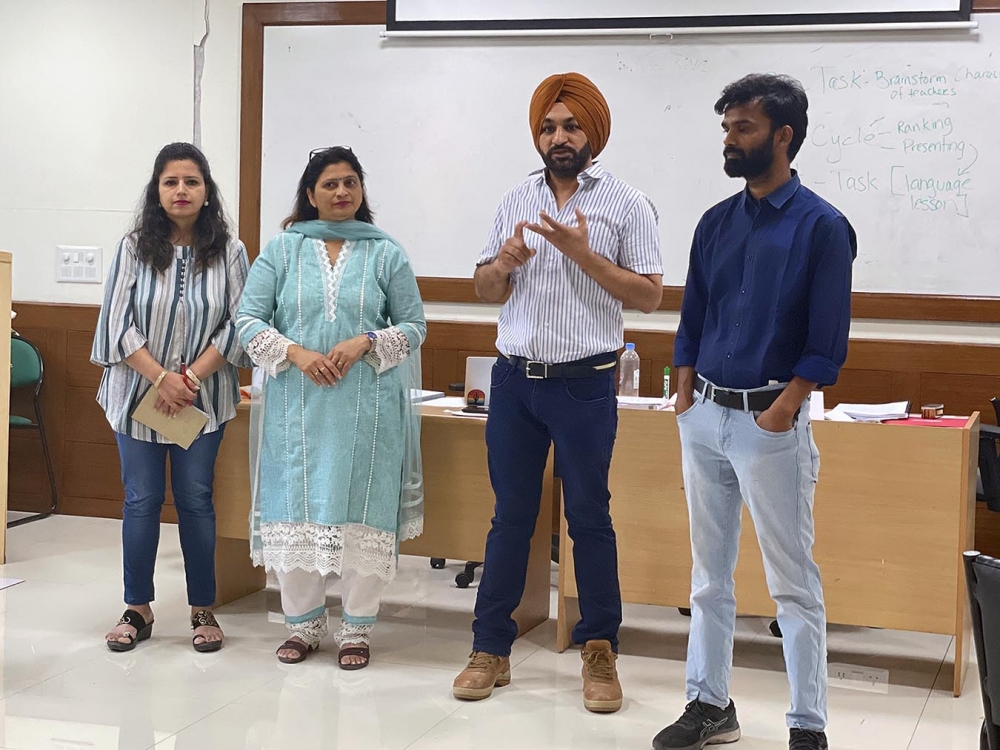
Group presentations.
In-Person Course Considerations and
Supports
The TCCP Teaching Adolescent Learners courses were
held in person in 2022 and 2023 and provided the opportunity for mentors to
experience a variety of new learning tasks, interactive activities, and
classroom management techniques. As many mentors had large class sizes and access
to a range of resources (from minimal to highly resourced and from high-tech to
low-tech), course modules were enhanced to provide examples that could work in a
variety of settings. Courses were held intensively over a 2-week period.
Mentors engaged in collaborative group projects, microteaching, and peer
feedback. Some specific innovations to the in-person courses included the
following:
-
Providing two instructors per course to support
feedback and collaboration in the intensified schedule
-
Ensuring adequate housing for teachers to avoid
long daily commutes and to mediate extreme temperatures, which allowed teachers
to be present and focused during long training days
-
Collaborating with local training centers to host
the courses and reduce program costs, while building capacity by including
their staff as participants
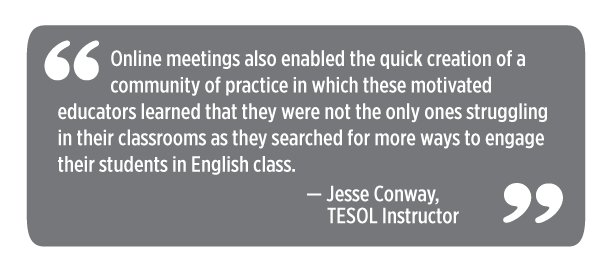
Blended Teaching Practicum Innovations
The 20-hour teaching practicum had been challenging
as a culminating aspect of the blended certificate, because it was open-ended,
with approximately a year to complete 10 hours of classroom observation and 10
hours of practice teaching. With the long deadline, participants often waited
until the very last day and then began the practicum, which often resulted in
multiple extensions to the program deadline, and attrition from mentors who
moved on to other projects. The most recent innovations to the practicum
successfully supported the early completion of mentors and increased
interaction and engagement in the process. Two key innovations supported mentor
success:
- Scheduling the practicum requirements with
biweekly due dates
-
Adding virtual coaching and collaborative peer
review sessions on Zoom
Breaking the practicum requirements into scheduled
tasks with due dates helped mentor teachers to stay engaged and complete the
requirements collaboratively while their learning from the courses was fresh.
They were able to implement practices from the courses and get feedback from
multiple mentors from multiple states/territories and continued to strengthen
their community of practice and their ability to provide constructive feedback
in lesson review using practicum rubrics and feedback protocols.
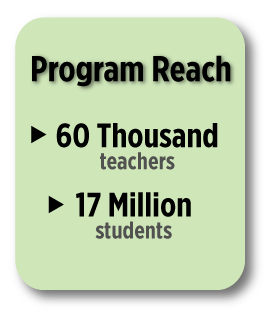 Mentors were asked to submit short teaching videos
in the WhatsApp groups and watch their peers’ implementation of various
teaching practices and activities. They were asked to attend a minimum of three
virtual coaching sessions with teachers from their state. However, they could
attend up to nine sessions if they chose to. In the sessions, practicum
coordinator Kati Milter facilitated the collaborative feedback sessions and
reinforced targeted skills from the training, resulting in a lively and
collaborative practicum experience.
Mentors were asked to submit short teaching videos
in the WhatsApp groups and watch their peers’ implementation of various
teaching practices and activities. They were asked to attend a minimum of three
virtual coaching sessions with teachers from their state. However, they could
attend up to nine sessions if they chose to. In the sessions, practicum
coordinator Kati Milter facilitated the collaborative feedback sessions and
reinforced targeted skills from the training, resulting in a lively and
collaborative practicum experience.
Program Outcomes
Based on mentor surveys and instructor feedback, we
know the impact of the program has been extensive and meaningful. Through
cascading trainings in a variety of ways, state government mentors in the
program collectively provided professional learning opportunities to reach more
than 60,000 teachers in India. Those teachers have reached more than 17 million
students and impact new students each year. Teacher feedback indicated a
variety of ways the program impacted them both personally and professionally
(see Figure 1).
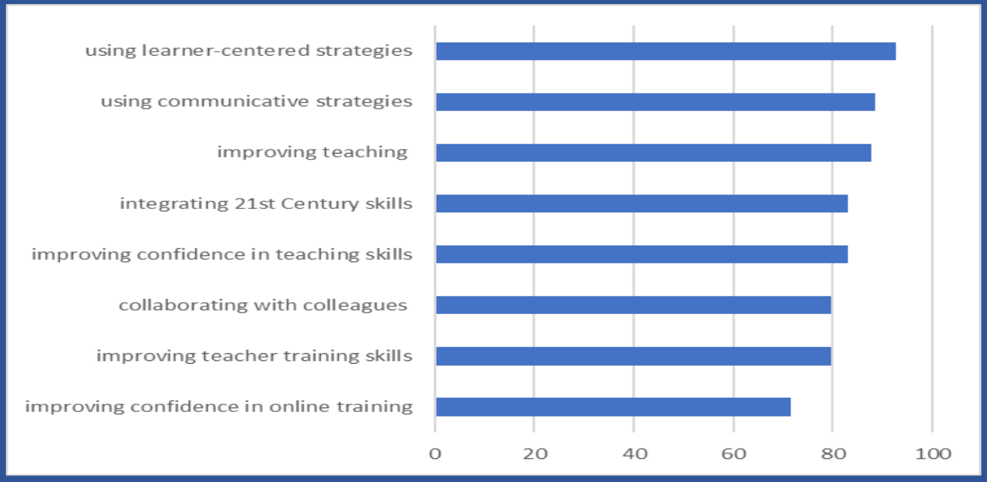
Figure 1. Ways teachers reported the program was
helpful to them. (Click here to enlarge; Source: Multicohort program follow-up survey;
spring 2023)
Teachers also shared that the program had an impact
on students. The following comments were shared by mentor teachers in a
follow-up survey conducted in 2023:
|
“I used more activities in my teaching. Students were excited to see what activity, task, game or song would be in the next classes. This changed entire attitudes of the students regarding academics.”
“They started taking responsibility for self- learning.”
“Learning became a joyful experience to them and fun-filled session.”
“They are now able to express themselves in English confidently.” |
Teachers shared reflections about their own
learning and growth, including becoming more inclusive and flexible in
differentiating their learning, upgrading their technology skills, and
enhancing their own English skills:
|
“One highlight of the course is being tolerant towards all types and levels of learners.”
“In fact I was not well exposed to technology earlier but this programme upgraded my technical skills in addition to professional skills.”
“I learnt to write without apprehension and that is what I encourage my students to do. Express without any fear.” |
Instructors also reported on the enriching exchange
and relationship building that happened, especially in the in-person courses.
Tamrika Khvtisiashvili, a TESOL instructor, shared:
I felt embraced literally and intellectually every
time the class ended. As I would introduce a concept, it was enhanced and
elevated by even a better and more holistic way to understand it. It might have
been the best example of horizontal learning that I've experienced in my
teaching career.
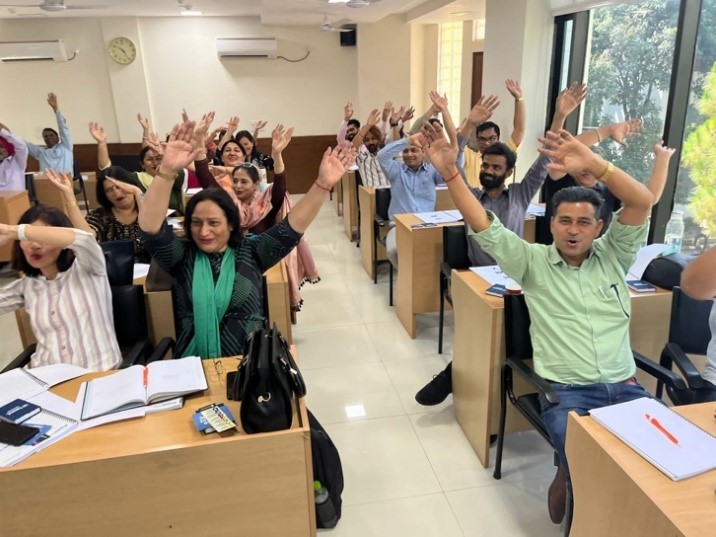
Engaged participants.
The
TESOL Blended Certificate Program for State Government Mentors, funded by the
American Embassy New Delhi Regional English Language Office, has provided a
rich and collegial opportunity for cultural and professional exchange and
collaborative learning that continues to grow in its impact and reach. For more
information on this program or to partner with TESOL on capacity building
programs, contact Heidi Faust at hfaust@tesol.org.
Heidi Faust, PhD, Grants, Projects, and Partnerships Officer at TESOL International Association, oversees international ELT capacity building programs and professional learning partnerships. She has recently led projects in India, Uzbekistan, Peru, the Dominican Republic, and Turkmenistan, and has developed and facilitated online and in-person professional learning programs with teachers from more than 100 countries. Heidi is also an English language specialist for the U.S. Department of State and she has taught multilingual learners of English from primary to adult.